A law professor worries Israel could become the next Hungary
(JTA) — Israel’s new governing coalition has been called the “most right-wing” in the nation’s history. That’s heartening to supporters who want the country to get tough on crime and secure Jewish rights to live in the West Bank, and dismaying to critics who see a government bent on denying rights to Israel’s minorities and undermining any hope for a peaceful solution to the Israeli-Palestinian conflict.
While the far-right politics of new government ministers Bezalel Smotrich and Itamar Ben Gvir have drawn much of the world’s attention, a series of proposed changes to Israel’s judicial system has also been raising hopes and alarms. On Wednesday, new Justice Minister Yariv Levin announced an overhaul that would limit the authority of the High Court of Justice, Israel’s Supreme Court. It would put more politicians on the selection committee that picks judges, restrict the High Court’s ability to strike down laws and government decisions and enact an “override clause” enabling the Knesset to rewrite court decisions with a simple majority.
Levin and his supporters on the right justify these changes as a way to restore balance to a system that he says puts too much control in the hands of (lately) left-leaning judges: “We go to the polls, vote, elect, and time after time, people we didn’t elect choose for us. Many sectors of the public look to the judicial system and do not find their voices heard,” he asserted. “That is not democracy.”
Critics of the changes call them a power grab, one that will hand more leverage to the haredi Orthodox parties, remove checks on the settlement movement and limit civil society groups’ ability to litigate on behalf of Israeli minorities.
To help me make sense of the claims on both sides, I turned to Tom Ginsburg of the University of Chicago, where he is the Leo Spitz Distinguished Service Professor of International Law and co-directs the Comparative Constitutions Project, which gathers and analyzes the constitutions of all independent nation-states. He’s also a Jew who has transformed a former synagogue on the South Side of Chicago into a cutting-edge arts space, and says what’s happening with Israel’s new governing coalition “raises my complicated relationship with the country.”
We spoke on Friday. Our conversation has been edited for length and clarity.
Jewish Telegraphic Agency: You have written about law in Israel, which lacks a constitution but relies on a series of “basic laws” to define its fundamental institutions. You’ve written that the Israeli judiciary had become “extremely powerful” — maybe too powerful — in imbuing the basic laws with a constitutional character, but worry that the current reforms will politicize the court in ways that will undermine Israeli democracy.
Tom Ginsburg: The proposed reforms were a campaign promise of certain elements of this coalition who have had longstanding grievances against the Israeli judiciary. The Israeli judiciary over the last decades has indeed become extremely powerful and important in writing or rewriting a constitution for Israel, promoting human rights and serving as a check and balance in a unicameral parliamentary system where the legislature can do anything it wants as a formal matter. A lot of people have had problems with that at the level of theory and practice. So there have been some reforms, and the court has, in my view, cut back on its activism in recent decades and in some sense has been more responsive to the center of the country. But there’s longstanding grievances from the political right, and that’s the context of these proposals.
A lot of the concerns about the new government in Israel are coming from the American Jewish left. But in an American context, the American Jewish left also has a big problem with the United States Supreme Court, because they see it as being too activist on the right. So in some ways isn’t the new Israeli government looking to do what American Jewish liberals dream of doing in this country?
Isn’t that funny? But the context is really different. The basic point is that judicial independence is a really good thing. Judicial accountability is a really good thing. And if you study high courts around the world, as I do, you see that there’s kind of a calibration, a balancing of institutional factors which lead towards more independence or more accountability and sometimes things switch around over time.
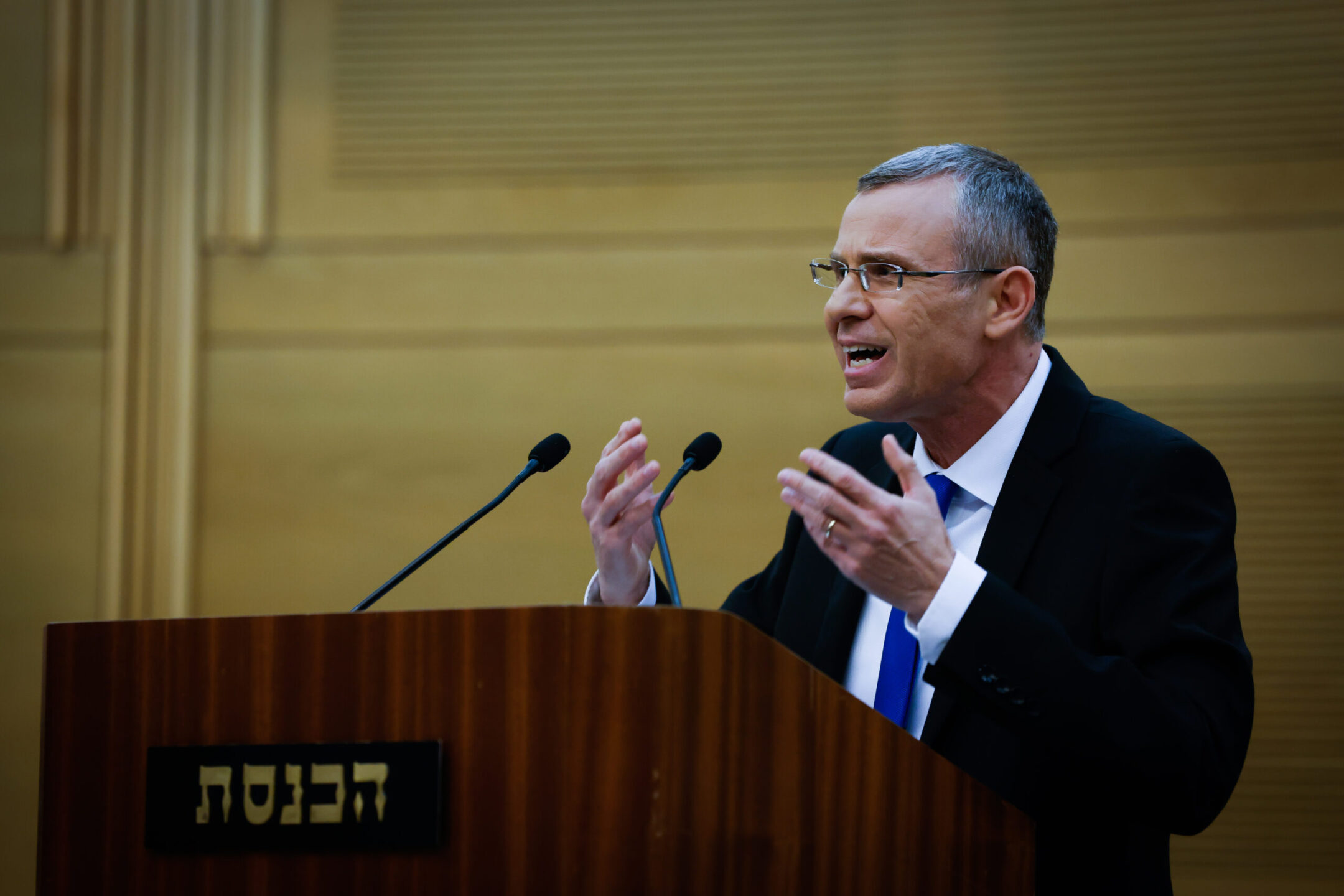
Israeli Justice Minister Yariv Levin holds a press conference at the Knesset, the Israeli parliament in Jerusalem, Jan. 4, 2023. (Olivier Fitoussi/Flash90)
You mean “accountability” in the sense that courts should be accountable to the public.
Right. The Israeli promoters of these plans are pointing to the United States, in particular, for the proposals for more political involvement in the appointment process. On the other hand, in the United States once you’re appointed politically, you’re serving for life. There’s literally no check on your power. And so maybe some people think we have too much independence. If these proposals go through in Israel, there will be a front-end politicization of the court [in terms of the selection commission], but also back-end checks on the court [with the override clause that would allow a simple majority to reinstate laws struck down by the Supreme Court]. So in some sense, it moves the pendulum very far away from independence and very much towards accountability to the point of possible politicization.
And accountability in that case is too much of a good thing.
Again, you don’t want courts that can just make up rules. They should be responsive to society. On the other hand, you don’t want judges who are so responsive to society that there’s no protection for the basic rights of unpopular minorities.
What makes Israel either unique or different from some of the other countries you study, and certainly the United States? Part of it, I would guess, is the fact that it does not have a constitution. Is that a useful distinction?
They couldn’t agree on a single written constitution at the outset of the country, but they have built one through what you might call a “common law method”: norms and practices over time as well as the system of “basic laws,” which are passed by an absolute majority of the Knesset, where a majority of 61 votes can change any of those. But while they’re not formally entrenched, they have a kind of political status because of that term: basic law.
By the way, the Germans are in the same boat. The German constitution is called the Basic Law. And it was always meant to be a provisional constitution until they got together and reunified.
If you don’t have a written constitution, what’s the source of the legitimacy of judicial power? What is to prevent a Knesset from just passing literally any law, including ones that violate all kinds of rights, or installing a dictator? It has been political norms. And because Israel has relied on political norms, that means that this current conflict is going to have extremely high stakes for Israeli governance for many decades to come.
Can you give me a couple of examples? What are the high stakes in terms of democratic governance?
First of all, let me just say in principle that I don’t oppose reforms to make the judiciary more independent or accountable in any particular country. But then you obviously have to look at the local context. What’s a little worrying about this particular example is that several members of this coalition are themselves about to be subject to judicial proceedings.
Including the prime minister, Benjamin Netanyahu.
Right. And for example, they need to change the rules so that [Shas Party chairman] Aryeh Deri can sit in the cabinet despite his prior convictions. That indicates to me that maybe this isn’t a good-faith argument about the proper structure of the Israeli, uncodified constitution, but instead a mechanism of expediency.
Any one of these reforms might look okay, and you can find other countries that have done them. The combination, however, renders the judiciary extremely weak. Right now, it’s a multi-stakeholder commission that nominates and appoints judges in Israel, and the new coalition wants to propose that the commission be made up of a majority of politicians. We know that when you change the appointments mechanism to put more politicians on those committees, the more politicized they become.
Think about the United States process of appointing our Supreme Court judges: It’s highly politicized, and obviously the legitimacy of the court has taken a big hit in recent years. In Israel, you’d have politicized appointments under these reforms, but then you also have the ability of the Knesset to override any particular ruling that it wanted. Again, you can find countries which have that. It’s called the “new commonwealth model” of constitutionalism, in which courts don’t have the final say on constitutional matters, and the legislature can overrule them on particular rulings. But I think the combination is very dangerous because you could have a situation where the Knesset — which currently has a role in protecting human rights — can pick out and override specific cases, which really to me goes against the idea of the rule of law.
You mentioned other countries. Are there other countries where these kinds of changes were enacted and we saw how the experiment turned out?
The two most prominent recently are Hungary and Poland, which are not necessarily countries that you want to compare yourself to.
Certainly not if you are Israel.
Right. There’s so much irony here. When the new Polish government came in in 2015, they immediately manipulated the appointment system for the Constitutional Court and appointed their own majority, which then allowed them to pass legislation which probably would have been ruled unconstitutional. They basically set up a system where they were going to replace lower judges and so they were going to grow themselves into a majority of the court. And that’s led to controversy and rulings outside the mainstream that have led to protests, while the European Union is withholding funds and such from Poland because of this manipulation of the court.
In Hungary, Victor Orban was a really radical leader, and when he had a bare majority to change the constitution he wiped out all the previous jurisprudence of the Constitutional Court. I don’t think the Israeli government would do that. But still there is this kind of worrying sense that they’re able to manipulate interpretation of law for their own particular political interest.
Another thing I want to raise is the potential for a constitutional crisis now. Suppose they pass these laws and the Israeli Supreme Court says, “Well, wait a minute, that interferes with our common law rules that we are bound by, going back to the British Mandate.” It conflicts with the basic law and they invoke what legal scholars call the “doctrine of unconstitutional constitutional amendments,” which is basically saying that an amendment goes against the core of our democratic system and violates, for example, Israel’s character as a Jewish and democratic society. Israel has never done this, but it is a kind of tool that one sees deployed around the world in these crises. And if that happened, then I think you would have a full constitutional crisis on your hands in Israel.

Supreme Court President Aharon Barak speaks with Prime Minister Benjamin Netanyahu during a ceremony in the Supreme Court marking 50 years of law, Sept. 15, 1998. (Avi Ohayon)
What does a constitutional crisis look like?
Suppose you have sitting justices in Israel who say, “You know, this Knesset law violates the basic law and therefore it’s invalid.” And then, would the Knesset try to impeach those judges? Would they cut the budget of the judiciary? Would they back down?
When you compare Israel’s judicial system to other countries’ over the years, how does it stack up? Is it up there among the very strong systems or is it known for flaws that might have maybe hobbled its effectiveness?
It’s always been seen around the world as a very strong judiciary. Under the leadership of Aharon Barak [president of Israel’s Supreme Court from 1995 to 2006] it became extremely activist. And this provoked backlash in Israeli politics. That led to a kind of recalibration of the court where it is still doing its traditional role of defending fundamental rights and ensuring the integrity of the political process, but it’s not making up norms left and right, in the way that it used to. This is my perception. But it’s certainly seen as one of the leading courts around the world, its decisions are cited by others, and because of the quality of the judges and the complex issues that Israel faces it’s seen as a strong court and an effective court and to me a balanced court.
But, you know, I’m not in Israel, and ultimately, they’re going to figure out the question how balanced it is or where it’s going to go. I do worry that an unchecked majoritarian system, especially with a pure proportional representation model like Israel, has the potential for the capture of government by some minorities to wield power against other minorities. And that’s a problem for democracies — to some degree, that’s a problem we face in the United States.
How correctable are these reforms? I am thinking of someone who says, “These are democratically elected representatives who now want to change a system. If you want to change the system, elect your own majority.” Is the ship of state like this really hard to turn around once you go in a certain direction?
This is an area in which I think Israel and the United States have a lot of similarities. For several decades now, the judiciary has been a major issue for those on the political right. They thought the Warren Court was too left-leaning and they started the Federalist Society to create a whole cadre of people to staff the courts. They’ve done that and now the federal courts are certainly much more conservative than the country probably. But the left didn’t really have a theory of judicial power in the United States. And I think that’s kind of true in Israel: It’s a big issue for the political right, but the political left, besides just being not very cohesive at the moment, isn’t able to articulate what’s good about having an independent judiciary. It is correctable in theory, but that would require the rule of law to become a politically salient issue, which it generally isn’t in that many countries.
How do you relate to what is happening in Israel as a Jew, and not just a legal scholar?
That’s a great question, because it really raises my complicated relationship with the country. You know, I find it to be a very interesting democracy. I like going to Israel because it’s a society in which there’s a lot of argument, a lot of good court cases and a lot of good legal scholars. On one level, I connect with my colleagues and friends there who seem very demoralized about this current moment. And I honestly worry about whether this society will remain a Jewish and democratic one with the current coalition.
The rule of law is a part of democracy. You need the rule of law in order to have democracy function. And I know others would respond and say, “Oh, you’re just being hysterical.” And, “This isn’t Sweden, it’s the Middle East.” But the ethno-nationalist direction of the country bothers me as a Jew, and I hope that the court remains there to prevent it from deepening further.
Why Israel’s new right-wing leaders immediately made plastic plates inexpensive again
TEL AVIV (JTA) — Devora Zien’s tiny apartment in Bnei Brak runs like a factory, but, she admits, not a very smooth one. With 12 mouths to feed three times a day, single-use plasticware is a basic necessity, she says. So when Israel’s then-Finance Minister Avigdor Liberman increased taxes on disposables in 2021, Zien said she was “in total shock.”
“For me, it’s more important than bread and milk,” she said. “It’s about survival. I can’t stand in front of the kitchen sink all day washing dishes — and where would I put a dishwasher even if I could afford one?”
Liberman’s tax on disposable dinnerware, as well as another set of taxes he imposed as finance minister on sugar-filled soft drinks, were viewed by many ultra-Orthodox Israelis as unfairly targeting their lifestyle and cynically using health and environmental considerations to single out their community.
This week, after Benjamin Netanyahu’s government was sworn in, Liberman’s successor, Bezalel Smotrich, in his first move as finance minister, signed orders repealing the tax hikes on disposables and sugary drinks.
Ultra-Orthodox lawmakers hailed the move, as did many in the broader haredi population. Images made the rounds on social media of haredi men celebrating the decision by drinking Cristal Mint, a low-in-price, high-in-sugar soda, from disposable plastic cups. Beyond the relief felt by members of the community, there was also a sense that the balance in Israel’s cultural war is once again tipping in their favor.
MK Uri Maklev of the haredi United Torah Judaism party, said the tax reversal underscored the new government’s policy of “working for the citizens and not against them.”
Israel is either the world’s top or second-biggest consumer of disposable tableware per capita, depending on the analysis, making the goods a natural target for environmental activists. And the taxes were projected to bring in $350 million annually to the country’s treasury, no small amount. That’s nearly twice, for example, what the city of Jerusalem spends each year on sanitation.
But the disposables were Liberman’s only target for environmental taxes, which came as he sought to address Israel’s high cost of living by cutting taxes on other goods. And no environmental activist himself, Liberman is well known for his fierce criticism of Israel’s haredi sector, which he says contributes too little to the country through work and army service.

Avigdor Liberman, center, holds a news conference following the dissolving of the Israeli parliament, in Tel Aviv, May 30, 2019. (Flash90)
“The only thing that matters to him is sticking his finger in our eye,” said Devora’s sister-in-law Yael Zien, a media personality who advocates on behalf of Israel’s haredi population. She went on to cite Liberman’s widely condemned statement that he would send haredi Jews on “wheelbarrows straight to the dumpster.”
“You can’t compare your average, secular, two-car family that orders takeaway, with the haredis. We also host far more family functions than any other sector,” Zien said. “Why not raise taxes on a second car? Or flights overseas?”
“Haredim are actually more green than anyone else. We buy less clothes, we don’t fly abroad, and our communities rely heavily on gmachim and passing things on,” she said, referring to the free-loan establishments that provide anything from baby bottles to evening gowns.
Though the taxation touched on a sensitive nerve and was viewed by both sides as another round in the cultural war between secular and Orthodox Israelis, when the dust settled, it turned out that both sides may actually agree on some important issues.
Despite saying she reacted with “ecstasy” to Smotrich’s moves, Zien is not entirely opposed to reinstating the taxes, but this time with cooperation from the affected parties and a multi-pronged approach. Addressing the sugary drinks, Zien believes that the government should have taken steps in parallel to raise awareness in haredi society about the danger of diabetes and not just enforce acts that could be interpreted as punitive.

Yael Zien, a haredi Orthodox personality and mother, said she opposed the tax on disposables — as it was enacted, not on principle. (Courtesy of Yael Zien)
Meanwhile, environmental activists, who had marveled at the taxation on plastic dishes, are willing to admit that Liberman might have paid too little attention to the needs of haredi communities.
Yael Gini, community director at Sustainable Development Goals Israel, noted that tax hikes are just one way to combat waste, and not necessarily the most optimal. Targeting businesses or public places with a blanket ban on disposables, as France enacted this week in what activists are calling a watershed moment, might have been a more prudent first step, she said.
“It’s a shame it came to this. This isn’t sectorial but it feels like it is. [Politicians] turned it into something political and the haredim are right about that,” said Gini, formerly a program director at Greenpeace.
“But [the haredim] need to understand, it’s not an us-versus-them situation,” she said, adding that the environmental impact of Israel’s use of disposables is “a disaster for everyone.”
Despite the political uproar created by the decision to tax single use dinnerware, anecdotal evidence shows it might have been effective, especially for haredi Orthodox families living on a tight budget. Data published in April 2022 by the Ministry of Environment indicated that purchase of single-use plastics in supermarkets had dropped nearly 50% since the taxes were imposed six months earlier. Critics of this survey noted, however, that it did not take into consideration the haredi community’s tendency to shop at convenience stores and to make large purchases before Jewish holidays.
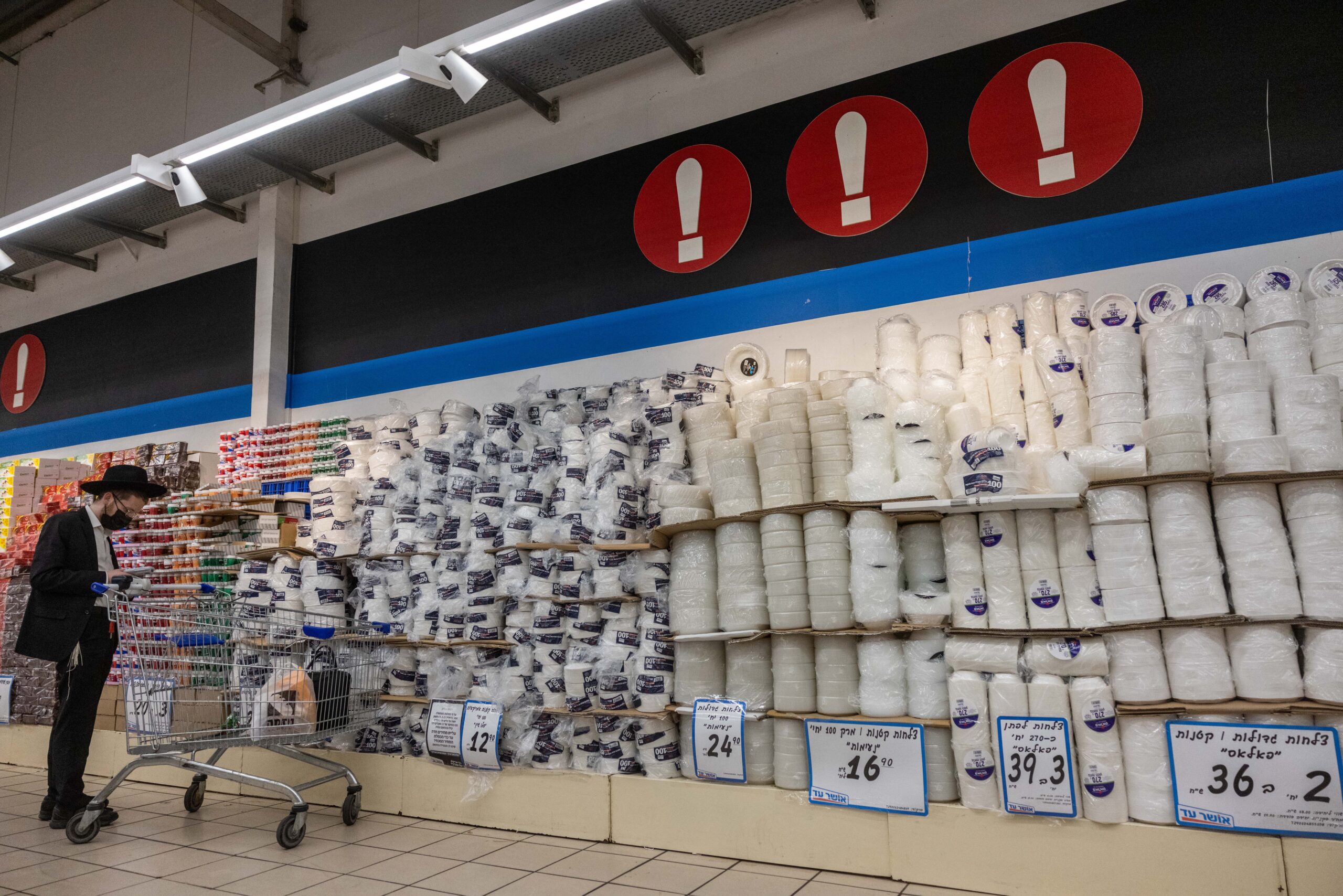
A man shops for disposable plastic tableware in the Osher Ad Supermarket branch in Givat Shaul, Jerusalem, Oct. 27, 2021. (Yonatan Sindel/Flash90)
For Leah, a Hasidic Orthodox mother of seven living in the cloistered Bukharian neighborhood of Jerusalem, Liberman’s policy worked.
“We finally got around to toivelling a dinner set that we had been gifted years before,” she said, referencing the Jewish practice of immersing dishes and utensils in a ritual pool to ensure that they can be used with kosher food.
She also went to IKEA to buy other multi-use items like casserole dishes and admits that she would not have made the trip had plasticware remained affordable. “Life is fast-paced and that was one less thing to worry about,” she said.
The adjustment took time and there were bumps in the road. “Many plates got broken, the children argued all the time over cups, but we got through it. I bought each child their own set and encouraged them to wash it.” Leah, who asked that her last name not be printed, has very little exposure to current affairs and was not aware of Smotrich’s rollback. While the move means she would probably allow herself to be less frugal about buying plastics in the future, she was unlikely to go back entirely to the way things were before, she said.
“It’s nice to eat Shabbat meals on real plates,” Leah said. “It feels more special.”
These Jews are defending Drag Story Hour against far-right protesters. Here’s why.
(New York Jewish Week) — As right-wing protestors descend upon Drag Story Hour events across New York, they have frequently been met by a loosely connected movement of counter protestors that includes many progressive Jewish groups.
Since September, right-wing activists have routinely protested Drag Story Hour events, where a person dressed in drag reads to children. The aim of these story times, according to the founder of the Drag Story Hour New York chapter, is to promote literacy while giving children positive queer role models.
At the Queens Public Library in Jackson Heights on Dec. 29, at least five members of the Proud Boys, a far-right extremist group, showed up to harass people attending a story session. Those protestors were met by hundreds of activists from the other side, many of whom are Jewish. They included members of Jews For Racial and Economic Justice, Outlive Them, United Against Racism and Fascism and other other organizations.
“We’re out here,” said Sharona Farber, 32, who is a member of the Jewish anti-fascist group Outlive Them, which formed in response to the 2018 Pittsburgh Tree of Life shooting and has since become involved with other forms of activism across New York such as fighting for the homeless and against U.S. Immigration Customs and Enforcement (ICE) raids.
Those protesting Drag Story Hours claim the events are harmful to children, calling parents who are bringing their kids to the event “groomers” and “pedophiles” to their face. Demonstrators have breached library doors in the city on three separate occasions. They have also vandalized the homes and offices, using anti-LGBTQ slurs, of three New York City Council members who have shown support for Drag Story Hour.
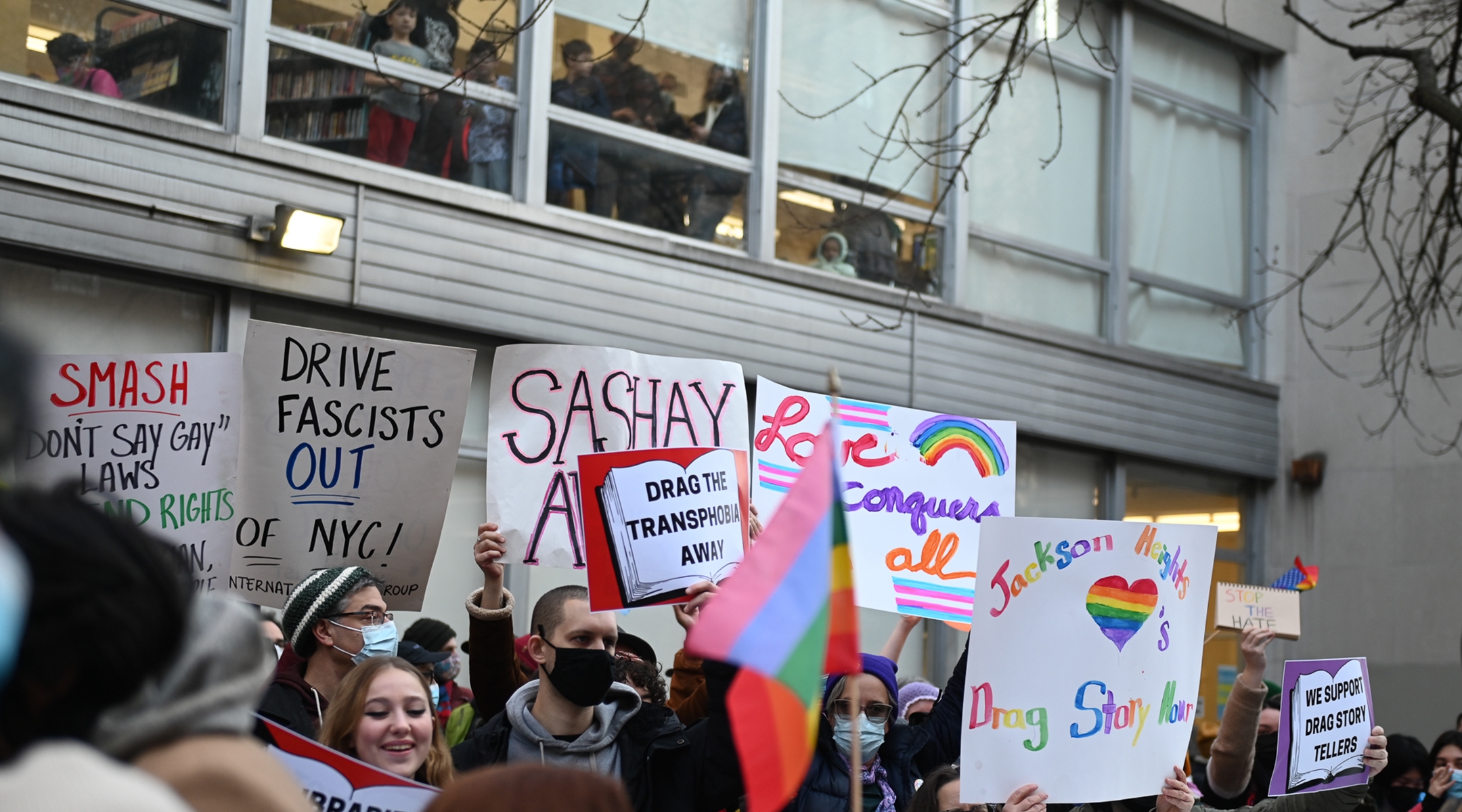
Hundreds of people defended the Queens Public Library at Jackson Heights against right-wing protestors, including members of the Proud Boys and neo-Nazis, last Thursday. (Gili Getz/Courtesy)
Protestors have targeted 10 Drag Story Hour events in New York, according to independent reporter Talia Jane, who has been documenting the group on Twitter since September.
This group of protestors, which calls itself the Guardians of Divinity, started as an anti-vaccine movement in the pandemic. “We have lost our jobs and been arrested for protesting this madness,” a statement on the group’s Twitter said. “Now they are coming for your kids with programs like Drag Queen Story Hour, where they steal your tax money to pay grown men in dresses to read gender questioning books.”
Farber told the New York Jewish Week that last Thursday there were at least 300 people defending Drag Story Hour at the Queens library branch, from all ages and backgrounds. Farber added that “there are a lot of Jews” doing the behind-the-scenes work, the organizing and the outreach that goes into “pulling these defenses off.”
“Jews are so heavily represented in the left,” Farber said. “There’s been a reinfusion of energy on what people call the Jewish Left. There are people getting self organized into small groups that do take political action into what they believe is needed to create a better world.”
Sophie Ellman-Golan, communications director for Jews for Racial & Economic Justice, another prominent activist group that’s defending Drag Story Hour, told the New York Jewish Week that it’s important “to drown out fascists and neo-Nazis” by showing up in solidarity.
“When there’s a threat of neo-Nazi violence against synagogues, the idea is not that we should stop going to synagogue,” Ellman-Golan said. “We actually deserve to be able to gather and pray or engage in whatever culture and ritual we want to. We believe that a community of diverse New Yorkers coming together to ensure that can happen, that’s the best way to do that, with community defense.”
She described the scene as “two sides”: one that included colorful rainbow signs, glitter and Disney songs, while the other side included a neo-Nazi giving a “Heil Hitler” salute while talking about “a future for white children.”
“It’s a violent attempt to stamp out trans people,” Ellman-Golan said, adding that there is “a very clear link between antisemitism and transphobia that is increasing at a terrifying rate.”
Ariela Rothstein, a queer Jewish parent who took her 6-month-old child to the Jackson Heights Drag Story Hour last Thursday, told the New York Jewish Week that these shouldn’t be controversial events. “It’s people sharing stories with kids,” Rothstein said. “There were people shouting all kinds of names. Things that are really disgusting, that I don’t really want to repeat or put in print. All we wanted to do was go into the library and hear some stories for our child.”
Rothstein’s partner, Lauraberth Lima, told the New York Jewish Week that the right-wing protestors are “embarrassing themselves.”
“It’s actually sad,” she said. “What we’re actually doing is talking about love and spreading representation of different types of people.”
After last Thursday’s event, a video circulated online showing members of the Proud Boys being led by members of the New York Police Department into the 74th Street-Broadway subway station in Jackson Heights without paying.
“We don’t feel like the NYPD is there to actually protect or defend or anything like that,” Ellman-Golan said. “If their goal is to make sure that Drag Story Hours can continue in peace, they are failing.”
https://twitter.com/LipBrenna/status/1609705212398260226
The NYPD said in a statement on Monday that it was trying to “to deescalate the situation and prevent further violence a decision was made to escort one group to the Jackson Heights subway station to remove the group from the area.”
According to Lima, however, the video of the police letting the Proud Boys into the subway showed them getting “a literal free pass for what they were doing.”
“The police never protected families like ours,” Lima said. “That’s not who we turn to for safety. We are protecting ourselves. The queer community understands very well what it means to be ostracized or hated, and knows how to show up for people.”
Miriam, a queer Jewish activist who regularly shows up to defend Drag Story Hour, told the New York Jewish Week that she was only comfortable giving out her first name out of fear of being doxxed — having her private information made public — by the right-wing protestors. “This can result in significant stress, but also loss of unemployment, housing and in some cases physical attacks,” Miriam said. “If your employers get 50 calls a day from people telling them that you are a pedophile, that may make your life hard. It’s a significant concern.”
Miriam said that these protests are a personal attack on her queer identity, but “it doesn’t mean I’m there as a queer person rather than a Jew.”
“I’m there as both things,” Miriam said. “Jews have to be opposed to fascism because fascism is opposed to Jews. Jewish history and Jewish culture gives us ample reasons to oppose fascism. We should never be letting fascists in the streets unopposed, no matter what they are doing.”
Rabbi Rachel Goldenberg of Malkhut, a progressive congregation in Jackson Heights, showed up at a Drag Story Hour defense on Oct. 28 at the library. She told the New York Jewish Week that “it was a pretty unnerving experience, to be facing such right-wing vitriol.”
“The hatred feels like it’s coming from the same place of white supremacist activism, which holds hands with antisemitism,” Goldenberg said. “It was really painful and shocking to hear the language that was being used.”
She recalled how a large man burst into her group while they were singing in front of the library. “He was very loud, hostile and violent,” Goldenberg said. “Not by throwing punches, but he had a violent vibe. You get the sense that they have been riled up by lies and conspiracy theories. They have no qualms about getting in our faces and accusing us of wanting to groom children.”
Goldenberg surmised that so many Jews are showing up to protect Drag Story Hour because they’re inspired by the emphasis Judaism places on education. “We value learning,” Goldenberg said. “We value being open to multiple opinions, we value open discussion — that’s what Torah is about. Drag Story Hours and public libraries are then all very much tied into Jewish values.”
“These are our family members,” she added. “These are our friends. These are our neighbors. This is us as Jews.”
German zoo gets $26 million from widow of animal-loving Holocaust survivor
(JTA) — The zoo in Cologne, Germany, has gotten its first check from the $26 million gift promised by the widow of a Holocaust survivor who credited the city’s residents for saving him during the war.
Elizabeth Reichert willed the funds to the Cologne Zoological Garden in 2017 in honor of her husband Arnulf, who died in 1998. Both Reicherts were born in Cologne and met during World War II, when Elizabeth was part of the local anti-Nazi resistance network and Arnulf, a German Jew, was in hiding with the network’s help.
“They only survived the war in Germany thanks to the help of courageous people from Cologne, who offered hiding places to the Jew Arnulf Reichert,” the zoo said in a statement in German this week.
Though they moved to Israel and, after five years, America after the war, Arnulf and Elizabeth maintained affection to the city for the rest of their lives.
“We were born in Cologne and we remember forever Cologne,” Reichert said in 2017.
In the United States, they settled in New Jersey, where the couple started and ran a successful pet wholesale business. They never had children. Reichert chose the zoo out of all institutions in Cologne because of her and Arnulf’s love of animals.
“Arnulf wanted to give the money someplace where it would do good,” Elizabeth Reichert said in 2017 when she announced the planned gift. “When you think about leaving money, memories play a major role.”
Reichert died in February 2021, at the age of 96, and it was not until recently that her estate was settled and funds could be disbursed. The zoo reported that it had received the first payment from the trust, of more than $700,000 dollars, and said it expected annual disbursals to top $1 million in the future. The gift, a zoo official said in 2017, was unusual in Germany where large philanthropic gifts are rare and would be used to improve the zoo for animals and visitors alike.
The zoo said it is planning to name its South American section after Arnulf Reichert.

Athletes run past sea lions at the Cologne zoo during the Zoolauf, where children and adults can run past animals, June 24, 2022. (Roberto Pfeil/picture alliance via Getty Images)
Reichert had been giving a monthly donation of over $7,000 since announcing the gift. But her giving to the zoo goes all the way back to 1954, when she and Arnulf donated a soft-shelled turtle they brought from the Jordan River to Germany by boat on a nine-day journey, feeding it cold cuts of meat along the way.
Cologne’s zoo is not the first in Europe to be associated with Holocaust survivors. Zookeepers in Warsaw sheltered 300 Jews from the Nazis inside the zoo, in a dramatic story that was the subject of a novel and then a 2017 movie adaptation starring Jessica Chastain.
ESPN broadcaster Chris Berman among International Jewish Sports Hall of Fame’s 11 inductees for 2023
(JTA) — Renowned broadcaster Chris Berman and a German Jew who once said hockey “saved me and my family from the Holocaust” are among the International Jewish Sports Hall of Fame’s annual class of inductees.
The 2023 class, shared exclusively with the Jewish Telegraphic Agency, includes athletes and sports figures from across sports and around the world — from water polo to fencing, and from the United States to Hungary.
Jed Margolis, president of the hall of fame, told JTA that the 11 inductees were selected from a list of 150 nominees submitted through an open process throughout the past year. A confidential election committee of around 20 athletes, past award winners and sports experts voted on a smaller list of approximately 30 finalists.
“I’m first of all impressed with how there’s no shortage of qualified people — world record holders, people who’ve been at the highest level of their sport and voted into their particular sport hall of fame,” Margolis said. “You would think that we may run out of people, but we’re getting great nominations all the time.”
Margolis added that honoring Jewish athletes can help push back against stereotypes that Jews may not be athletic — most infamously depicted in the 1980 film “Airplane!”
“If you take a look at the numbers of who we represent worldwide, what are we, about 0.02% of the world population, and we’ve won about 0.03% of the Olympic medals. So we’re boxing above our weight, so to speak,” Margolis said.
The 2023 class brings the hall’s total to 448 members since its inauguration in 1981. Shoe designer and Maccabiah athlete and philanthropist Stuart Weitzman is also being honored, as are the recently retired editors of the Jewish Sports Review magazine.
The Hall, which is housed at the Wingate Institute for Physical Education and Sport in Netanya, Israel, will recognize this year’s honorees at its next induction ceremony in July 2025. Inductees are announced annually, but the ceremony itself is held every four years, when the Maccabiah Games take place.
For now, here’s what you need to know about this year’s honorees.
Rudi Ball, ice hockey
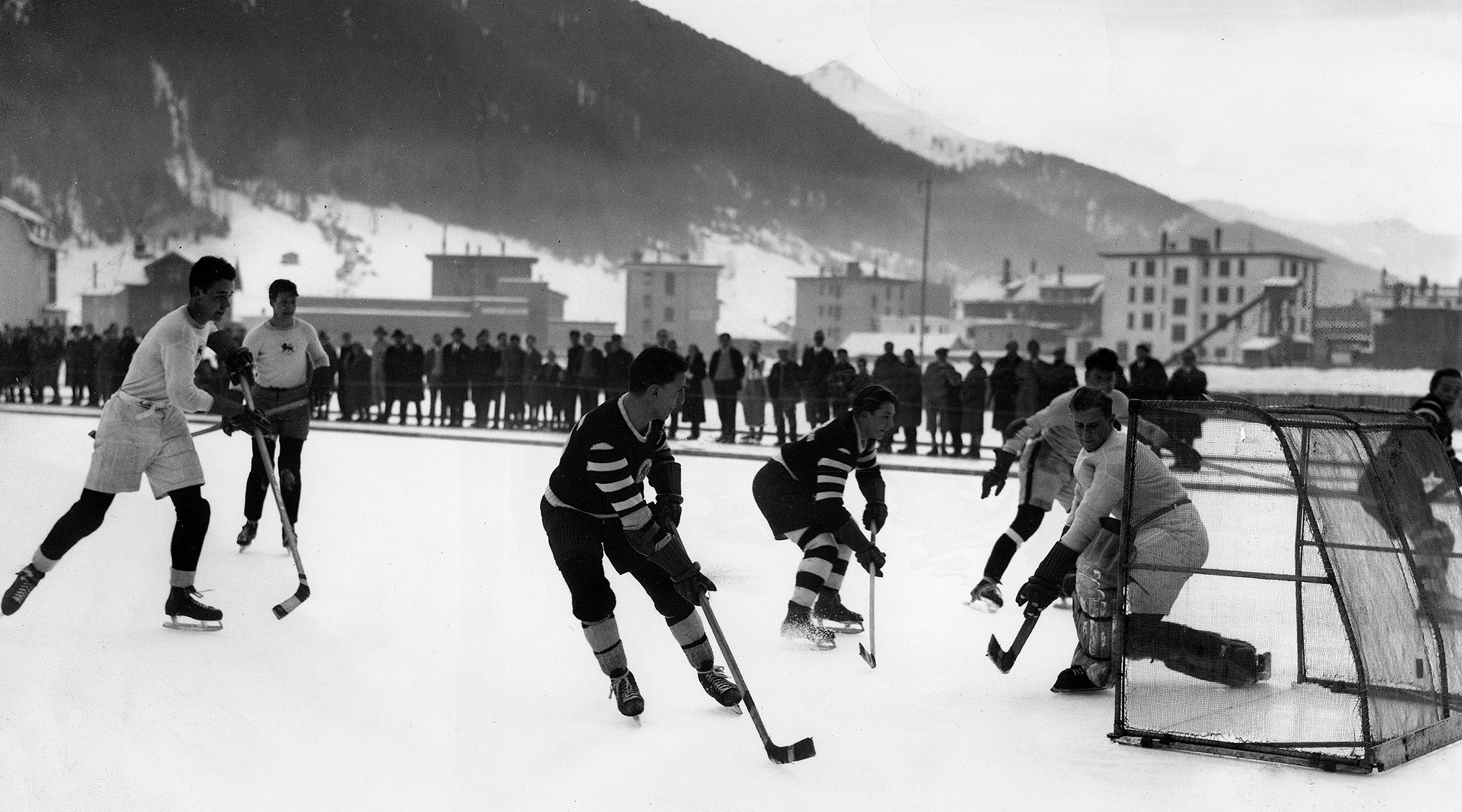
Rudi Ball, center, scores a goal in December 1931. (ullstein bild via Getty Images)
A member of the International Ice Hockey Hall of Fame, Ball (1911-1975) was one of two Jewish athletes to represent Germany at the 1936 Winter Olympics, held in Germany six months before the Berlin summer games that drew the world’s attention to Adolf Hitler’s Nazi regime.
During Ball’s playing career, which spanned from 1928 to 1952, the right winger won eight German championships and a bronze medal in the 1932 Winter Olympics in Lake Placid.
When the German Olympic Committee threatened to remove Ball from the team because he was Jewish, his teammates threatened to boycott the Games. According to The Guardian, Ball may have struck a deal with the Nazi regime, agreeing to play for Germany if his parents were allowed out of the country. He later said, “I am the one who owes hockey. It saved me and my family from the Holocaust.”
Chris Berman, broadcaster

ESPN anchor Chris Berman speaks during the Pro Football HOF Centennial Class of 2020 enshrinement ceremonies in Canton, Ohio, Aug. 7, 2021. (MSA/Icon Sportswire via Getty Images)
Award-winning broadcaster Chris Berman has been an anchor for ESPN’s flagship program “SportsCenter” since 1979, a month after it launched. Berman, 67, has primarily been the face of the network’s football coverage, but he has also anchored the U.S. Open golf tournament and the NHL Stanley Cup Finals and has done play-by-play for Major League Baseball games as well.
Nicknamed “Boomer,” Berman was raised in a Jewish family in Irvington, New York. He is a six-time recipient of the National Sportscasters and Sportswriters Association’s National Sportscaster of the Year award, an inductee of the Sports Broadcasting Hall of Fame and has his own star on the Hollywood Walk of Fame.
David Blatt, basketball
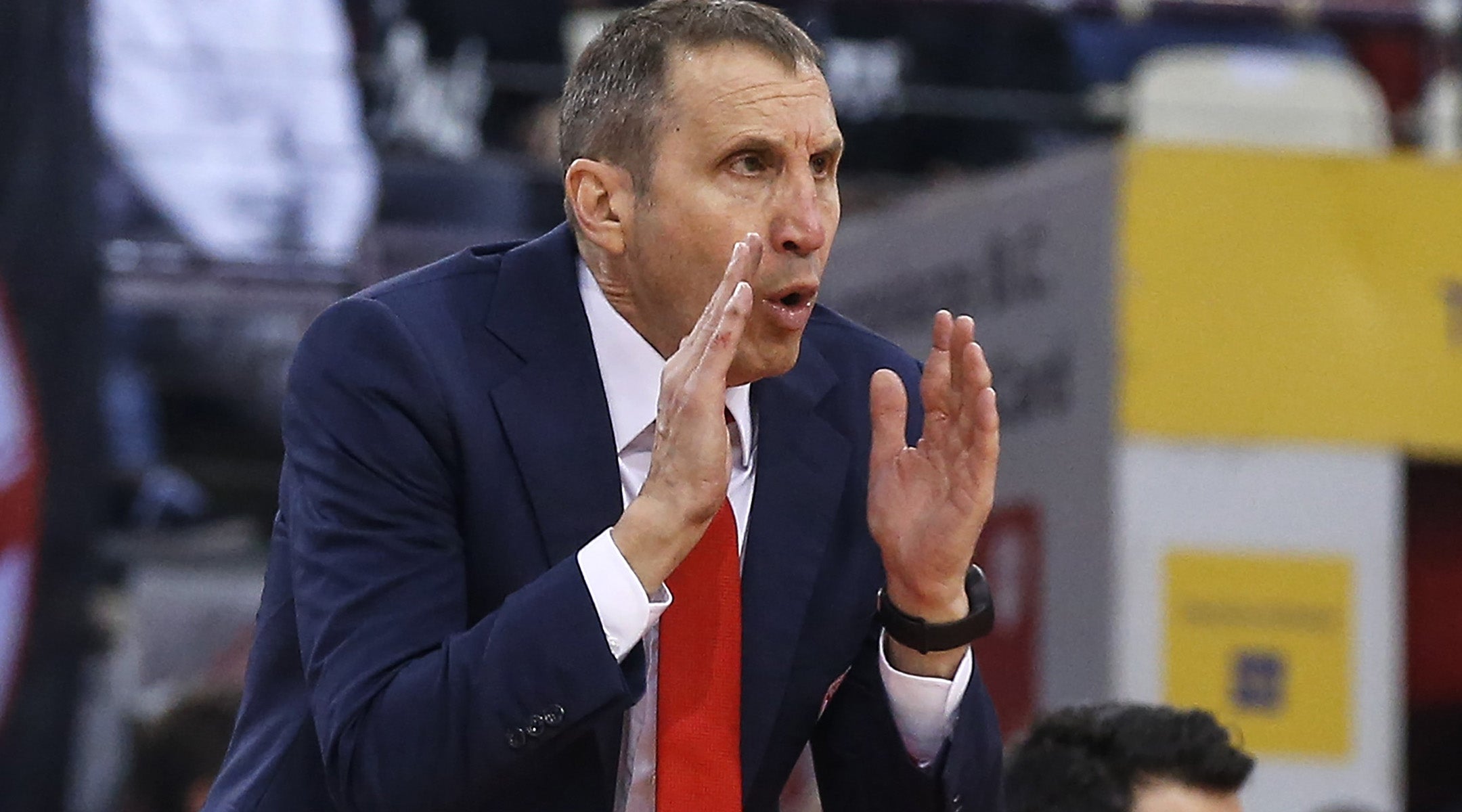
David Blatt coaching during a Turkish Airlines Euroleague match between the Olympiacos and Bayern Munich in Athens, Greece, March 19, 2019. (Ayhan Mehmet/Anadolu Agency/Getty Images)
David Blatt is a decorated former basketball player, coach and executive whose career has included playing at Princeton University; professional basketball leagues in Israel, Italy, Russia, Turkey and Greece; and a stint as head coach of the NBA’s Cleveland Cavaliers.
Blatt, 63, who was born in Boston and grew up attending a Reform synagogue, moved to Israel in 1981, where he served in the military and played professionally for more than a decade before turning to coaching.
Blatt won championships and coaching accolades throughout his career, and has also played in the Maccabiah Games and coached in the Olympics. He led the Cavaliers to the 2015 NBA Finals in his first season as coach, and received a ring for the team’s championship the following year, despite being fired halfway through the season.
Deena Kastor, track & field
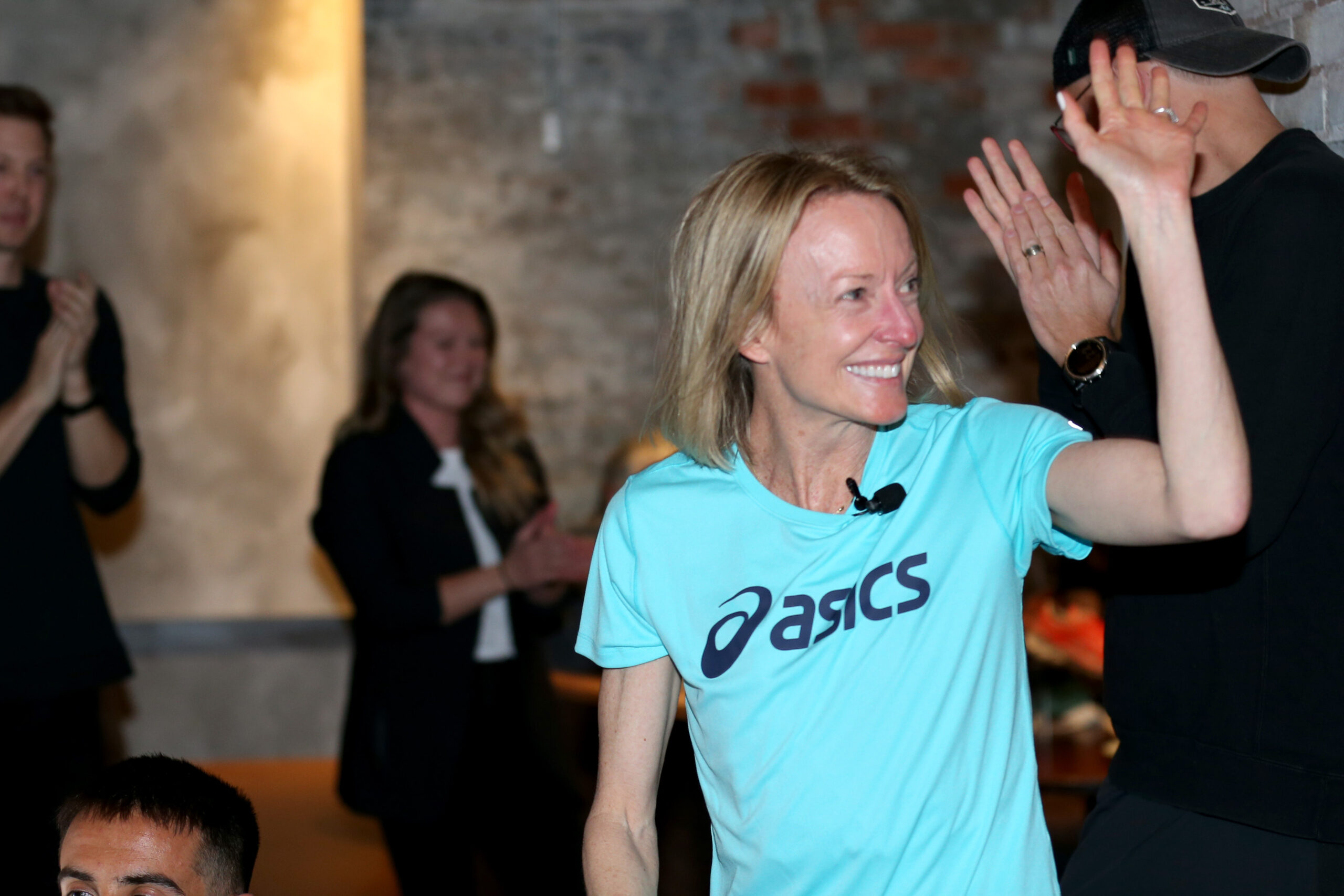
Deena Kastor attends an ASICS event, Feb. 27, 2020. (Carmen Mandato/Getty Images for ASICS)
A Boston-area native, Deena Kastor is an eight-time national champion in cross country who won a bronze medal at the 2004 Olympics and holds U.S. records for the 10-mile, 15-kilometer and 8-kilometer women’s road races. She previously held the U.S. record for women’s marathon and half marathon.
Kastor, 49, is a member of the National, New York and Southern California Jewish Sports Halls of Fame, and has also earned various honors from USA Track & Field.
Ilona Elek-Schacherer, fencing
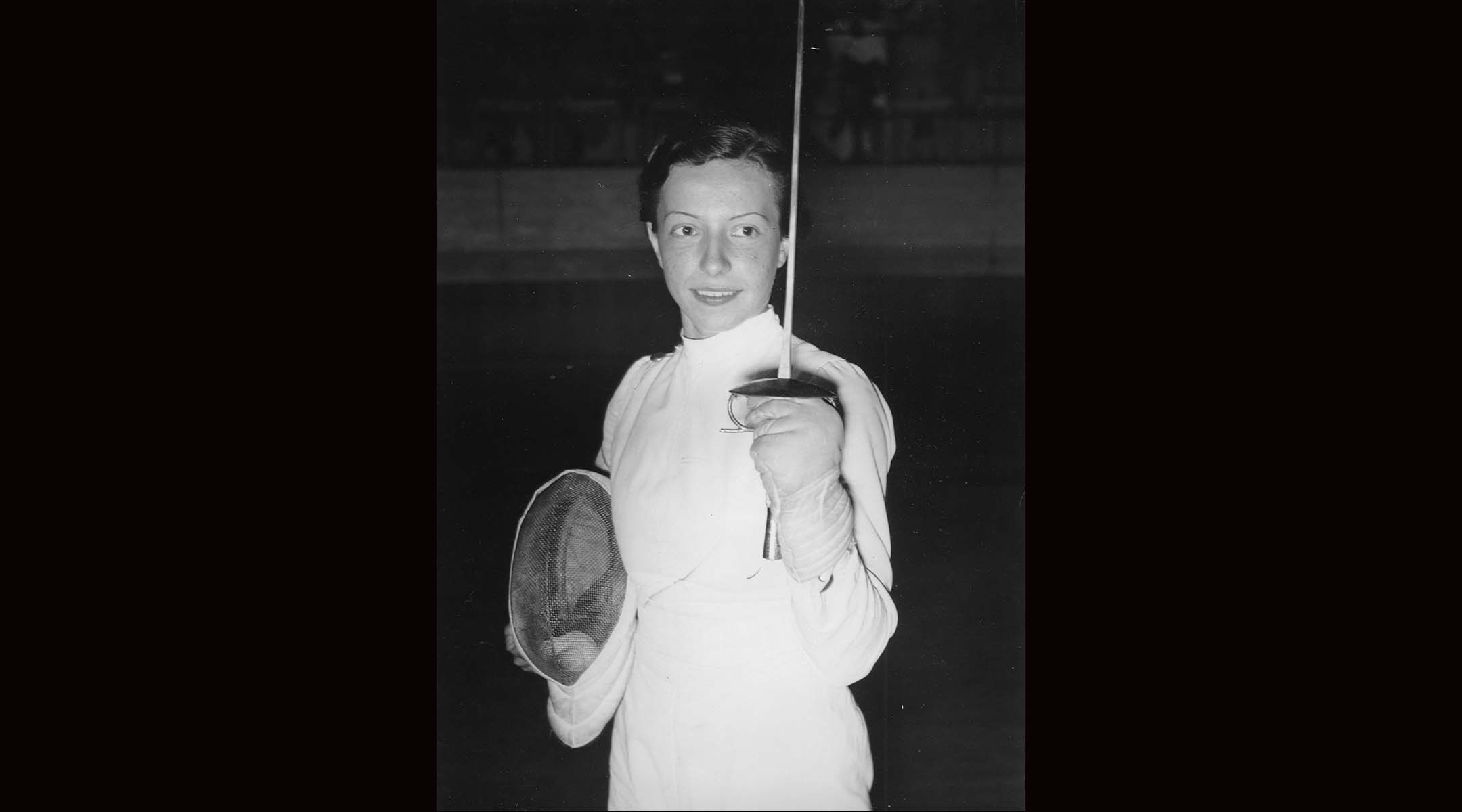
The Hungarian fencer Ilona Elek-Schacherer wins in foil fencing during the Olympic Games, Aug. 1936. (Austrian Archives/Imagno/Getty Images)
Born in Budapest to a Jewish father and Catholic mother, Ilona Elek-Schacherer (1907-1988) would go on to become perhaps the greatest woman fencer of all time.
Elek-Schacherer competed in three Olympics for Hungary between 1936 and 1952, winning two gold medals and one silver medal. She also won 10 gold medals, five silver medals and two bronze medals in World Championships spanning 1934 to 1956. (It is unclear how she spent the war years.)
She won more international fencing titles than any other woman.
John Frank, football

John Frank, center, during a game at Candlestick Park on Dec. 7, 1990, in San Francisco, California. (Andrew D. Bernstein/Getty Images)
John Frank is a two-time Super Bowl champion tight end with the San Francisco 49ers who has enjoyed a successful second career as an otolaryngologist (ear, nose and throat doctor) with a focus on hair restoration surgery.
Frank, 60, also played football at Ohio State University, where he set a school record for receptions by a tight end and was twice honored as an Academic All-American. He was the team’s most valuable player his senior year.
Frank also co-founded the Israeli bobsled team and is a member of the Ohio State Athletic Hall of Fame, the National Jewish Sports Hall of Fame and the Western Pennsylvania Jewish Sports Hall of Fame.
Merrill Moses, water polo
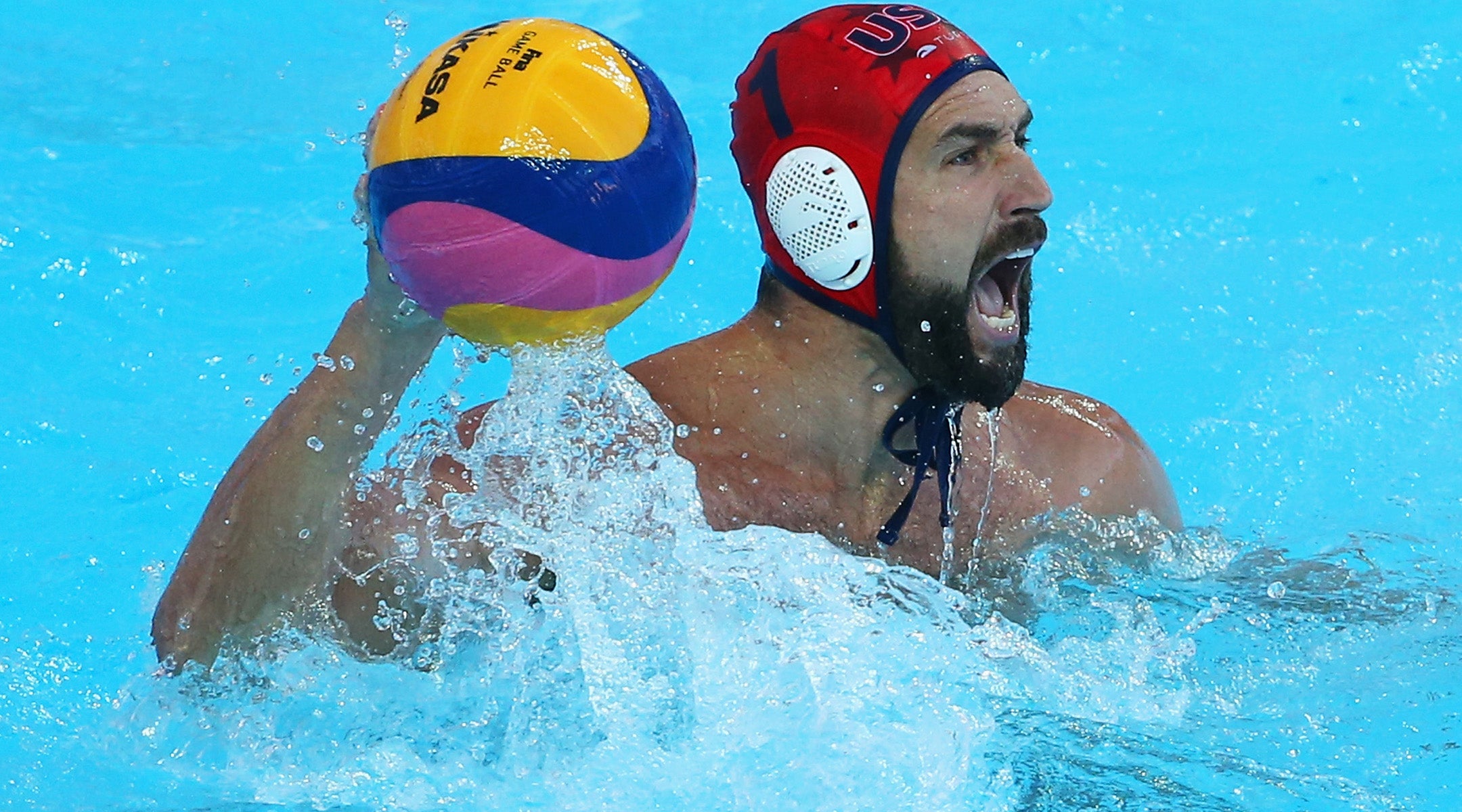
Merrill Moses during a match between the United States and Russia in Kazan, Russia, July 27, 2015. (Streeter Lecka/Getty Images)
Merrill Moses is a three-time Olympic water polo goalkeeper who earned a silver medal at the 2008 Beijing Olympics and won the 1997 NCAA water polo championship with Pepperdine University.
Moses, 45, also played for the U.S. team in the 2012 and 2016 Olympics, and won gold medals at three Pan American Games in 2007, 2011 and 2015. He was inducted into the USA Water Polo Hall of Fame in 2021 and is also a member of the Southern California Jewish Sports Hall of Fame.
Moran Samuel, rowing

Moran Samuel competes during the 2022 World Rowing Championships in Racice, Czech Republic, Sept. 21, 2022. (Adam Nurkiewicz/Getty Images)
Moran Samuel is an Israeli world champion paralympic rower and basketball player. After suffering a spinal stroke in 2006, Samuel became paralyzed in her lower body.
Samuel, 40, played for Israel in the 2013 European Wheelchair Basketball Championship in Frankfurt. As a rower, she represented Israel at the Paralympic Games in 2012, 2016 and 2020. She won bronze and silver medals, respectively, in the latter two tournaments. Samuel also won a gold medal at the 2015 World Rowing Championships.
In 2012, Samuel won a race in single scull competition at a rowing tournament in Italy, but the event organizers were unable to play the Israeli national anthem — so she sang it herself.
Mordechai Spiegler, soccer
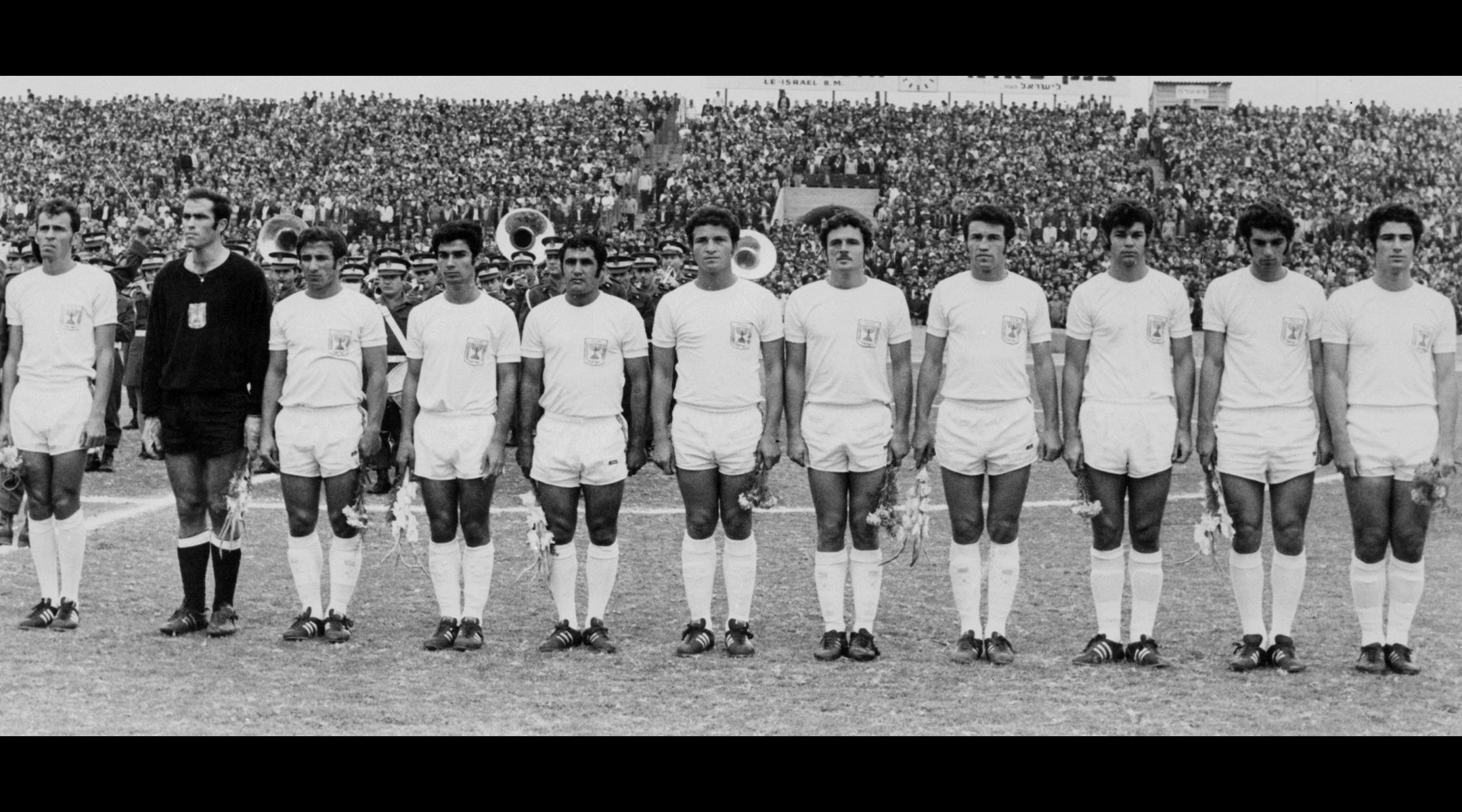
Mordechai Spiegler, far left, and the Israeli national soccer team lines up before a friendly match against Australia, May 25, 1970, in Mexico City. (Staff/AFP via Getty Images)
Considered among the best Israeli soccer players ever, Mordechai Spiegler’s crowning achievement was helping Israel qualify for the 1970 FIFA World Cup, the last time the country did so. He scored Israel’s only World Cup goal in history.
Spiegler, 78, was captain of the Israeli Olympic team that reached the quarterfinals at the 1968 Mexico City Olympics, and his 32 national team goals were a record until 2021. Spiegler also coached for many years in Israel. He is a member of the Israeli Football Hall of Fame.
Outside of Israel, Spiegler played for the vaunted Paris Saint-Germain club and for the New York Cosmos of the North American Soccer League, where he was teammates with the Brazilian soccer legend Pelé, who died last month.
Dwight Stones, track & field

Dwight Stones competes in the men’s high jump final during the 1984 United States Olympic Track and Field Trials in Los Angeles, June 1984. (David Madison/Getty Images)
Los Angeles native Dwight Stones is a two-time Olympic bronze medalist in high jump, including at the 1972 Munich Olympics, which was marred by the terrorist attack that killed 11 members of the Israeli delegation.
Stones, 69, won 19 national championships in his 16-year career, and still holds multiple world records. In 1984, he became the first athlete to both compete and be an announcer at the same Olympics. He has since served as a television analyst, including at the 2008 Summer Olympics.
Stones is a Maccabiah Games alum and is a member of the U.S. Track Hall of Fame, the California Sports Hall of Fame and the Orange County Jewish Sports Hall of Fame.
Ariel Ze’evi, judo
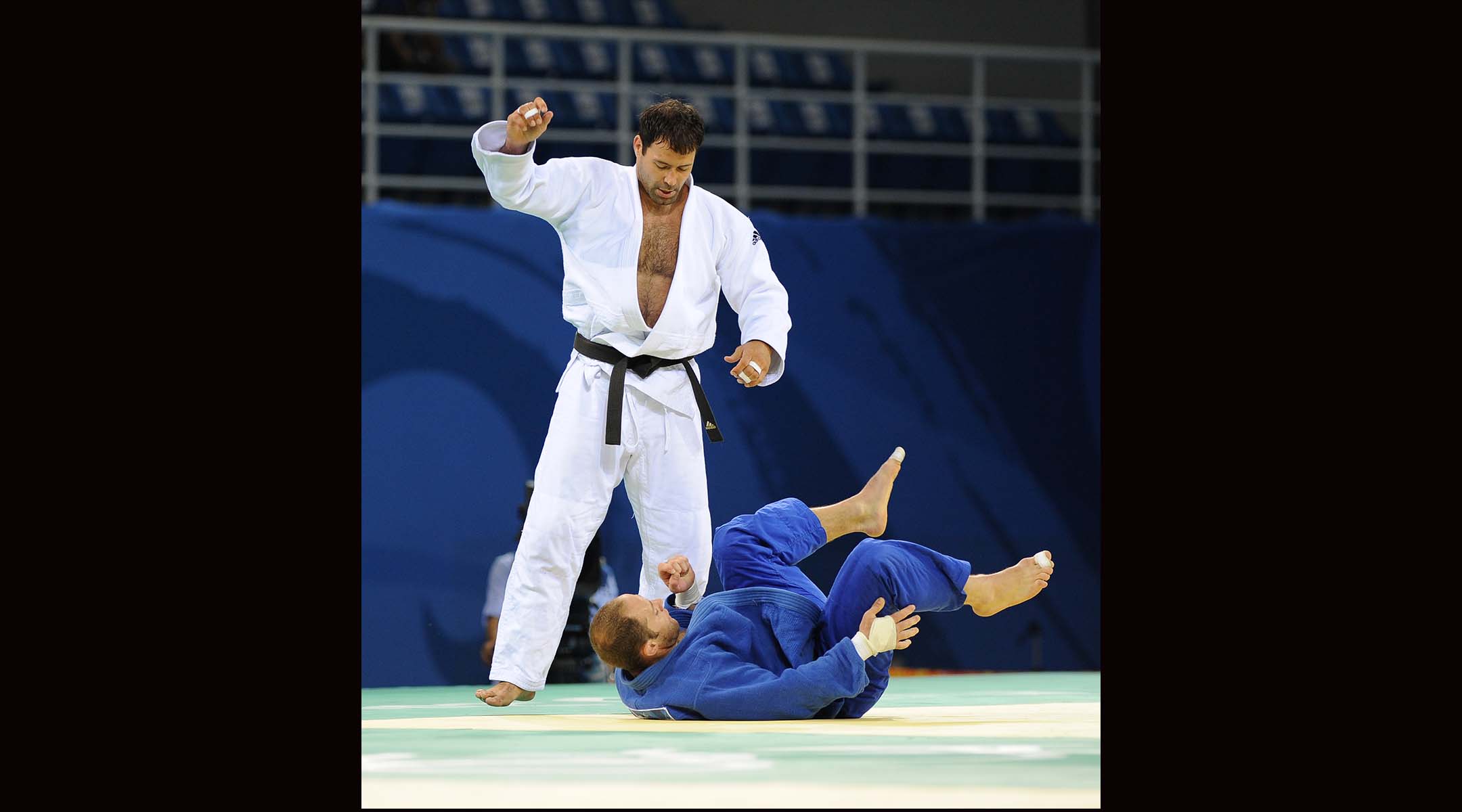
Israel’s Arik Ze’evi in action against France’s Frederic Demontfaucon in the Men’s -100kg class in Beijing, 2008. (Tony Marshall/PA Images via Getty Images)
Ariel Ze’evi is a retired Israeli judo champion.
Nicknamed “Arik,” the 45-year-old Bnei Brak native won a bronze medal at the 2004 Olympics as well as four European championships and a silver medal at the 2001 World Championships.
He also competed in the 1997 Maccabiah Games, two International Judo Federation Grand Slams (including a 2011 win) and two IJF Grand Prix.
Other honorees

Stuart Weitzman served as the U.S. team’s flag bearer. (Courtesy Maccabi USA)
The IJSHOF is also honoring shoe designer Stuart Weitzman with its lifetime achievement award and longtime co-editors of the Jewish Sports Review Ephraim Moxson and Shel Wallman with an award of excellence.
Weitzman is a Maccabiah pingpong medalist who has supported Maccabi USA with millions of dollars of support.
Moxson and Wallman recently concluded a 25-year run producing the Jewish Sports Review, a bimonthly magazine identifying Jewish athletes from college through professional sports.
Israeli democracy may not survive a ‘reform’ of its Supreme Court
(JTA) — On Dec. 29, Israel swore in Benjamin Netanyahu’s sixth government. The Likud leader became Israel’s prime minister once more, and one week later, Israel’s long-anticipated judicial counterrevolution began.
In the Knesset Wednesday, newly minted Justice Minister and Netanyahu confidant Yariv Levin unveiled a package of proposed legislation that would alter the balance of power between Israel’s legislature and its Supreme Court.
At the core of this plan is a bill to allow the Knesset to override the Supreme Court. Levin’s proposals — which almost certainly have the immediate support of a Knesset majority, regardless of Levin’s assurances that they would be subject to “thorough debate” — would pave the way for Israel’s new government to pass legislation that curtails rights and undermines the rule of law, dealing a blow to Israeli democracy.
The dire implications of this proposed judicial reform are rooted in key characteristics of the Israeli political system that set it apart from other liberal democracies. Israel has no constitution to determine the balance of power between its various branches of government. In fact, there is no separation between Israel’s executive and legislative branches, given that the government automatically controls a majority in the parliament.
Instead, it has a series of basic laws enacted piecemeal over the course of the state’s history that have a quasi-constitutional status, with the initial intention that they would eventually constitute a de jure constitution.
Through the 1980s, the Knesset passed basic laws that primarily served to define state institutions, such as the country’s legislature and electoral system, capital and military. In the 1990s, there was a paradigm shift with the passage of two basic laws that for the first time concerned individuals’ rights rather than institutions, one on Human Dignity and Liberty (1992) and the other on Freedom of Occupation (1994). These laws enshrined rights to freedom of movement, personal freedom, human dignity and others to all who reside in Israel.
Aharon Barak, the president of Israel’s Supreme Court from 1995 to 2006, argued that these laws constituted a de facto bill of rights, empowering the court to review Knesset legislation and to strike down laws that violate civil liberties, a responsibility not explicitly bestowed upon the court in the basic law pertaining to the judiciary. In 1995, the Supreme Court officially ruled that it could indeed repeal legislation that violates the country’s basic laws, heralding an era of increased judicial activism in Israel in what became known as the “judicial revolution.” The court has struck down 20 laws since, a fairly modest number compared to other democracies.
The judicial revolution of the 1990s shifted the balance of power in Israel’s political system from one of parliamentary sovereignty, in which the Knesset enjoyed ultimate power, to one in which the legislature is restricted from violating the country’s (incomplete) constitution. Israel’s Supreme Court became a check on the legislative branch in a country that lacks other checks and balances and separations of power.
As a result of these characteristics, the Supreme Court currently serves as one of the only checks on the extraordinary power of Israel’s 120-member Knesset — which is why shifting that balance of power would have such a dramatic impact on Israel’s democracy.
Levin’s proposed judicial overhaul includes several elements that would weaken the power and independence of Israel’s Supreme Court. The plan includes forbidding the Supreme Court from deliberating on and striking down basic laws themselves. It would require an unspecified “special majority” of the court to strike down legislation, raising the threshold from where it currently stands.
Levin has also called for altering the composition of the selection committee that appoints top judges to give the government, rather than legal professionals, a majority on the panel. It would allow cabinet ministers to appoint legal advisors to act on their behalf, rather than that of the justice ministry, canceling these advisors’ role as safeguards against government overreach. Should a minister enact a decision that contravenes a basic law, the ministry’s legal advisor would no longer report the violation to the attorney general, and would instead merely offer non-binding legal advice to the minister.
The pièce de résistance is, of course, the override clause that would allow the Knesset to reinstate laws struck down by the Supreme Court by 61 members of Knesset, a simple majority assuming all members are present. The sole restriction on this override would be a provision preventing the Knesset from re-legislating laws struck down unanimously, by all 15 judges, within the same Knesset term.
This plan’s obvious and most immediate result would be the effective annulment of the quasi-constitutional status of Israel’s basic laws. If the Knesset’s power to legislate is no longer bound by basic laws, these de facto constitutional amendments no longer have any teeth. There are no guardrails preventing any Knesset majority from doing as it wishes, including violating basic human rights. The Knesset could pass laws openly curtailing freedom of the press or gender equality, for example, should it choose to do so.
This counterrevolution, in effect, goes further than merely undoing what occurred in the 1990s.
Most crucially, the Knesset that would once again enjoy full parliamentary sovereignty in 2022 is not the Knesset of Israel’s first four decades. Shackling the Supreme Court is essential to the agendas of the new government’s various ultra-right and ultra-religious parties. For example, the haredi Orthodox parties are eager to re-legislate a blanket exemption to the military draft for their community, which the court struck down in 2017 on the grounds that it was discriminatory. They also have their sights on revoking recognition of non-Orthodox conversions for immigrants to Israel, undoing a court decision from 2021.
The far-right, Jewish supremacist parties of Bezalel Smotrich and Itamar Ben-Gvir, meanwhile, see an opportunity to deal a decisive blow to an institution that has long served as a check on the settlement movement. They hope to tie the court’s hands in the face of oncoming legislation to retroactively legalize settlements built on private Palestinian land, which are illegal under Israeli law. But this is only the beginning: Neutering the authority of the court could pave the way for legal discrimination against Israel’s Arab minority, such as Ben-Gvir’s proposal to deport minorities who show insufficient loyalty.
The timing of Levin’s announcement Wednesday could not be more germane. The Knesset recently amended the basic law to legalize the appointment of Aryeh Deri, the Shas party leader who is serving a suspended sentence for tax fraud, as a minister in the new government. The Supreme Court convened Thursday morning to hear petitions against his appointment from those arguing that it is “unreasonable” to rehabilitate Deri given his multiple criminal convictions, a view shared by Israel’s attorney general. Levin’s proposals would bar the court from using this “reasonability” standard.
The Israeli right has long chafed at the power of the Supreme Court, which it accuses of having a left-wing bias. But a judicial overhaul like this has never enjoyed the full support of the government, nor was Netanyahu previously in favor of it. Now, with a uniformly right-wing government and Netanyahu on trial for corruption, the prime minister’s foremost interest is appeasing his political partners and securing their support for future legislation to shield him from prosecution.
In a system where the majority rules, there need to be mechanisms in place to protect the rights of minorities — political, ethnic and religious. Liberal democracy requires respect for the rule of law and human rights. Yariv Levin’s proposals to fully subordinate the Supreme Court to the Knesset will concentrate virtually unchecked power in the hands of a few individuals — government ministers and party leaders within the coalition who effectively control what the Knesset does. That those individuals were elected in free and fair elections is no guarantee that the changes they make will be democratic.
How long before new TikTokers see Nazi content? 75 minutes, according to a Jan. 6 committee test
WASHINGTON (JTA) — The committee investigating the Jan. 6, 2021, attack on the U.S. Capitol wanted to test how fast it took social media to get to radical content. The answer, when it came to TikTok and Nazis, was just over an hour.
It took TikTok 75 minutes to deliver Nazi content to a new user who did not seek it, the committee found, according to a report Thursday in Rolling Stone. The magazine is one of a number of publications reviewing the committee’s final release of documents as the U.S. House of Representatives transitions from Democratic to Republican control.
Committee staffers were testing a theory that social media giants were reluctant to police right-wing extremist content in part because of pushback from then-President Donald Trump and his supporters who argue that such controls inhibit conservative speech.
The Jan. 6 riot, which resulted in multiple deaths, was carried out by supporters of Trump who believed his false claim that he had won the 2020 election. That lie spread on social media, where right-wing accounts were some of the most seen during the period between the election and Jan. 6, after which several social media giants, including Twitter, banned Trump.
The staffers on the committee’s social media team invented Alice, a 41-year-old woman from Acton, Massachusetts. It took “Alice” 75 minutes of scrolling without prompts or interactions to get to Nazi content, the staffers reported.
The social media team said in a draft summary that “Alice” was “just one of the Committee’s experiments that further evidenced the power of TikTok’s recommendation algorithm in creating rabbit holes toward potentially harmful content.”
The incoming Republican majority in the House, which includes a substantial portion of Trump backers, has indicated that it will seek to bury as much of the findings of the Jan. 6 committee as it can. Meanwhile, legislators on both sides of the aisle have said they plan to scrutinize TikTok, which is owned by a Chinese company, because of its presentation of harmful content and its potential security risks.
Meet Amichai Chikli, Israel’s new Diaspora minister, who opposes BDS and Reform Judaism
(JTA) – The Israeli ministry responsible for engaging with the half of the world’s Jews who don’t live in Israel has gotten a new name — and a leader who disdains the values of many American Jews.
Amichai Chikli announced during his swearing-in ceremony Monday that his ministry was changing its name from the Ministry of Diaspora Affairs to the Ministry for Diaspora Affairs and the Struggle Against Antisemitism. The name change is a sign that Chikli could plan to focus on the problems of the Diaspora more than his predecessors, who have focused largely on promoting Israel to Diaspora Jews.
Chikli is the son of a Conservative rabbi who lives on a kibbutz founded by the Conservative movement of Judaism, which he defends but says he no longer identifies with. He vaulted into prominence within Israel last year when he became the first member of the Knesset, Israel’s parliament, to break with then-Prime Minister Naftali Bennett over Bennett’s decision to form an alliance with left-wing and Arab parties.
Though Chikli holds some views promoted by Diaspora Jews, he is disdainful of Reform Judaism, the largest denomination in the United States, and of the politics of American liberals, including President Joe Biden, who won a wide majority of U.S. Jews’ votes. He has said he believes the Pride flag is an anti-Zionist symbol and also equates public criticism of the Israeli government with antisemitism, a position that American Jewish groups have been fastidious about saying they do not hold.
“I have a problem with the trend of Reform Jews seeking to assimilate and affiliate themselves with groups who are anti-Israel,” Chikli told the Forward last year.
“The Reform movement has identified itself with the radical left’s false accusations that the settlers are violent, so they have earned the criticism against them, and I cannot identify with them,” he told the Jerusalem Post, also last year. “They are going back to their roots in Germany of anti-Zionism and anti-nationalism. It’s a tragedy that they are going there.”
Chikli’s appointment comes as Israel inaugurates a right-wing government that includes extremist parties, as well as one minister who has been convicted of inciting violence. The government and its priorities have drawn sharp criticism from Diaspora Jews, including from hundreds of U.S. rabbis who have pledged not to invite any members of extremist coalition blocs to speak to their communities.
Unlike some of his colleagues in the new government, Chikli says he believes there should be a space for egalitarian prayer at the Western Wall, a priority for many Diaspora Jews. He also criticized a haredi rabbi’s condemnation this week of Amir Ohana, a gay ally of Prime Minister Benjamin Netanyahu who is the new Knesset speaker, saying on Twitter, “There is no disease more dangerous than baseless hatred.”
But he appears to be on the same page as some of the extremist politicians about the propriety of LGBTQ demonstrations, calling Tel Aviv’s Pride Parade a “disgraceful vulgarity” in a Facebook post this summer. (He said he believes sexual identity should be “subdued.”) He also shares their disdain of Reform Judaism, a frequent target for some of the Religious Zionist politicians who are part of the governing coalition.
In his new role, Chikli faces the task of winning over American Jewish leaders who may well be skeptical of or dismayed by Israel’s rightward shift. With his coalition seeking to narrow the definition of who is considered Jewish, make it harder to move to Israel, and strip rights from minority groups within Israel, including LGBTQ Jews, Israeli Arabs and non-Orthodox Jews, that task could be quixotic.
One area of ideological overlap, though, is in the fight against antisemitism, which watchdogs say is on the rise in the Diaspora.
Israel has gotten more involved in fights over antisemitism and anti-Zionism in the United States in recent years, appointing actress and activist Noa Tishby as its first ever “special envoy for combating antisemitism and delegitimization” last year. Tishby’s travels have included visiting the campus of the University of California-Berkeley in the midst of a student anti-Zionist controversy at that school, and making appearances as a talking head on Fox News.
Chikli has indicated that colleges and universities are an area of special interest for him. “I am very worried about what is happening on the campuses,” he said in the Jerusalem Post interview. “It is heartbreaking to see Jewish young people who concede their connections to their people and their heritage in order to connect to the latest fashionable movement that they are calling woke.”
The Israeli government also involved itself in recent legal negotiations that resulted in regional rights to ice-cream maker Ben & Jerry’s being sold to an Israeli company after the Ben & Jerry’s U.S. board attempted to halt the sale of its products in “occupied Palestinian territories.”
Like U.S. Jewish leaders (and Biden), Chikli vociferously opposes the movement to boycott, divest from and sanction Israel, known as BDS. He believes that anti-Israel sentiment is inherently antisemitic, issuing a stern warning to American Jews in his Forward interview.
“Don’t think that joining anti-Israel movements will help you with anything,” he said. “In the end, the folks from the BDS movement will attack you and your children because it’s not Israel that they hate, they hate Judaism.”
On Wednesday, Chikli accused Yair Lapid, the opposition leader and past prime minister, of being “the spearhead of the BDS movement” because Lapid plans to speak critically to U.S. audiences about the new government.
“What Lapid is doing now as an outgoing prime minister is a disturbing irresponsibility,” Chikli said in public comments that he also tweeted. “He does not understand that when he tells the whole world that this is a ‘dark’ government, the world does not make a separation between government and state. That’s exactly how BDS does its work.”
Chikli’s predecessor, Nachman Shai, met early in his tenure with the heads of the Reform, Conservative and Orthodox movements in the United States to push the message that Israel would embrace all denominations of Judaism equally.
On the occasion of the new government, Shai recently said that Israel could soon become hostile to Reform and Conservative Judaism.
Exactly how Chikli plans to engage with Diaspora Jews in his role, and when, is not yet clear; he did not respond to a request for an interview on Thursday. But he has started his tenure by taking action — canceling a 5 million NIS ($1.4 million) contract with a nonprofit group that Shai had struck shortly after the election. Chikli said the group, which has ties to Israel’s left, was “political” but that he was canceling the contract because it was inappropriate to strike one when the ministry’s leadership was set to change.
Another plan approved shortly before the election also faces an uncertain future: a $2.3 million contract with the Reform and Conservative movements in the United States to improve Israel’s image among young and liberal American Jews.
In Netflix’s ‘You People,’ Jonah Hill is a Jewish guy who finds love with a Farrakhan follower’s daughter
(JTA) – Were Jews the “OG slaves”? Can American slavery be compared to the Holocaust? And who gets the last word on Louis Farrakhan?
These questions have spurred very serious debates over time — and now will be getting a raunchier take in the new Netflix comedy “You People” that hits streaming Jan. 27.
Starring Jewish funnyman Jonah Hill, who also co-wrote the script with “Black-ish” creator Kenya Barris, the film stars a visibly tattooed Hill as Ezra, a young Jewish man who falls in love with Amira, a Black woman played by “Without Remorse” actress Lauren London.
In a new trailer for the movie that opens with a scene shot at the Skirball Cultural Center, a Jewish institution in Los Angeles, Hill’s Jewish parents, played by Julia Louis-Dreyfus and David Duchovny, seem to immediately bless the union following some awkward comments about hair and rappers.
It’s Amira’s parents, Akbar and Fatima (played by Eddie Murphy and Nia Long), who prove a tougher sell — particularly once Akbar, who says he identifies as “Muslim,” tells them he is a follower of Nation of Islam leader Louis Farrakhan, whose antisemitism is longstanding and well known. If Murphy’s character is following in the long tradition of adopting zany antics to try to prevent a marriage, it’s not clear in the trailer, where he tells Ezra’s mother that his hat was a gift from Farakkhan.
“Are you familiar with the minister’s work?” Murphy asks Louis-Dreyfus. “I’m familiar with what he said about the Jews!” she replies.
Other awkward moments abound in the trailer, including a dinner-table argument about comparing slavery to the Holocaust. (“Our people came here with nothing like everybody else,” says Louis-Dreyfus’s character, to cringes.) It’s all in a day’s work for Barris, whose series of sitcoms are known for prompting uncomfortable conversations about race and culture, and who — in the recent aftermath of antisemitism controversies involving Kanye West, Kyrie Irving and Dave Chappelle — has found quite the moment for a “Guess Who’s Coming To Dinner”-style comedy about Black-Jewish relations.
An earlier trailer for “You People,” featuring only Hill and Murphy, had made no references to the film’s Jewish content. The new trailer’s density of Jewish jokes is sure to fuel an ongoing debate over “Jewface,” or whether it is appropriate for non-Jewish actors to be cast as Jewish characters. While Hill is Jewish – the star recently petitioned to drop his legal last name, Feldstein, because he has never used it professionally — his on-screen parents are not. But Duchovny and Louis-Dreyfus do have Jewish fathers, as does London.
A new mural in Nolita celebrates a Holocaust rescuer
(New York Jewish Week) — In the heavily trafficked neighborhood of Nolita, a larger-than-life mural has popped up on the corner of Spring St. and Elizabeth St. Bright orange and pink paint spell out the words “Saved 3,000 Jewish Lives” next to a black and white portrait of Holocaust rescuer Tibor Baranski.
The mural, an art piece designed to combat hate and spark conversation, is the brainchild of “Artists 4 Israel,” a non-profit organization that aims to “prevent the spread of antisemitic and anti-Israel bigotry by helping to heal communities that have been affected by hate through art,” according to its CEO and co-founder Craig Dershowitz.
“Our rallying cry is art over hate,” Dershowitz said. Baranski’s portrait, painted by Fernando “SKI” Romero, a renowned graffiti artist based in Queens, is part of the organization’s “Righteous Among the Nations Global Mural Project.” It aims to establish a network of murals painted in cities around the world that feature other “Righteous Among the Nations” members who helped save Jews during the Holocaust.
“His story was beautiful and it really touched me,” Romero, who is Dominican, said of Baranski. Romero collaborated with Artists 4 Israel on deciding whom to feature in the New York mural. “The want to paint something came very easily with something so selfless,” he said.
The Baranski mural in Nolita is the third installment of the mural project; eventually there will be 10 murals around the world, said Dershowitz. Each subject is given a mural in their home state or country where they aided Jews: In Portugal, a mural of Aristides de Sousa Mendes, a diplomat who helped arrange passports for Jews has become a popular tour bus stop. In Greece, a mural of Mayor Loukas Karrer and Archbishop Dimitrios Chrysostomos led to national media coverage.
Though Baranski was Hungarian, he lived in Buffalo, New York for nearly six decades and felt at home in New York, which is why the Artists 4 Israel chose him for the mural in Manhattan.
In 1944, Baranski was 22 and studying to become a Catholic priest in Slovakia when the Russian Army invaded and he was forced to return to Budapest, where he grew up.
He never returned to the seminary, and abandoned his dream of becoming a priest. Instead, he dedicated the next years of his life to orchestrating the escape of more than 3,000 Hungarian Jews from the Holocaust.
After arriving in Budapest, Baranski headed to the Vatican embassy residence of the Papal Nuncio Angelo Rotta, where a long line of people were requesting help. The Vatican embassies in Switzerland, Sweden, Spain and Portugal were some of the only places where Jews and other refugees were able to secure letters of protection and necessary documents to leave their countries.

Carol Romeo, who said her family survived the Holocaust, pauses to touch the mural of Holocaust rescuer Tibor Baranski created by Fernando “SKI” Romero, a Dominican-American artist born and raised in Queens. “I never knew he existed,” she said of Baranski. “And he lived here in New York. Everyone should know his story.” (CAM and Artists4Israel)
Pretending to be a priest, Baranski managed to arrange a meeting with Rotta, where he secured documents for a Jewish family he knew. As the story goes, Rotta soon recruited Baranski to help organize protection letters, baptismal certificates and immigration certificates for Jews trying to escape Hungary. He also helped coordinate food and housing for the escapees. Over the next two months, Baranski saved 3,000 Jewish lives, according to official records — though his sons have said he believes the number was closer to 15,000.
After the war, Baranski was imprisoned by the Soviet army for five years for his anti-communist beliefs. He became a freedom fighter during the Hungarian Revolution of 1956 before moving to Rome to start a refugee camp with his wife Katalin.
Eventually the couple moved to Canada and then settled in Buffalo, where they were active members of the community and raised their three children, Tibor Jr., Kati and Peter.
Baranski, who died in 2019, was recognized by Yad Vashem as a Righteous Among the Nations in 1979, and was appointed by President Jimmy Carter to the U.S. Holocaust Memorial Council.
In an obituary in the New York Jewish Week, writer and close friend of Baranski’s Steve Lipman recalls an anecdote Baranski often repeated: “’Why do you, a Christian, help Jews?’ Uncle Tibor told me the Nazis asked him. ‘You are either silly or an idiot,’ he would answer. ‘It is because I am a Christian that I help the Jews.’”
For Dershowitz, who is based in Los Angeles, one of the goals of the murals — and his organization at large — is fighting antisemitism through education about Israel and the Holocaust. By making the art public and accessible, Dershowitz hopes people of all backgrounds will enjoy the art, and learn from it.
“These murals are very much for everyone to enjoy,” he said. “For the most part, they’re not geared towards the Jewish community as much as they’re geared towards a younger demographic, regardless of their religion or cultural heritage.”
Since its foundation in 2009, Artists 4 Israel’s principal mission has been to bring diverse groups of graffiti, street and mural artists to Israel to create projects that “benefit people in a direct, on-the-ground way,” such as painting murals in hospitals, bomb shelters and army bases. The organization has worked with more than 5,000 professional and amateur artists from 32 countries around the world, according to its website.
“When [the artists] come back [from Israel], they’re able to talk about the country and they’re able to speak about the Jewish people and be a window into the reality of Israel in the Middle East to their millions of followers,” Dershowitz explained.
In 2020, when COVID-19 arrived and international travel halted, the organization switched gears and started bringing their advocacy to cities around the world with the “Righteous Among the Nations” project.
For the artist Romero, the work has been especially gratifying. The 44 year-old artist has been involved with Artists 4 Israel since its inception and has visited Israel three times, painting murals for battered women’s shelters, community shelters and army bases.
“I’m creating art with purpose, which is beautiful. I’m also creating a dialogue. There’s a conversation,” Romero said. “This is one of those murals that touches home and it makes you really feel good. It is art that just separates itself from a lot of the noise out there.”
Painted over the course of two days, the mural will remain on the downtown corner for the next nine months.
At the unveiling party last month, which included a performance by singer Neshama Carlebach and blessings led by Rabbi Menachem Creditor, Baranski’s son Tibor Jr. retold his father’s story and emphasized the strong Catholic faith that guided him.
“Tibor Baranski was the merger of intellect and faith,” said his son, who drove from Buffalo for the event. “My father’s deeply held belief in God was uncompromising. It was the core driver in his saving thousands of innocent Jewish lives in 1944 in Nazi-occupied Hungary.”
“I will quote my father since his words captured the essence of our Catholic faith and what this mural that Fernando painted commemorating him represents: ‘Love each other, love each other sincerely. God is love. Love destroys hatred,’” he added.



















